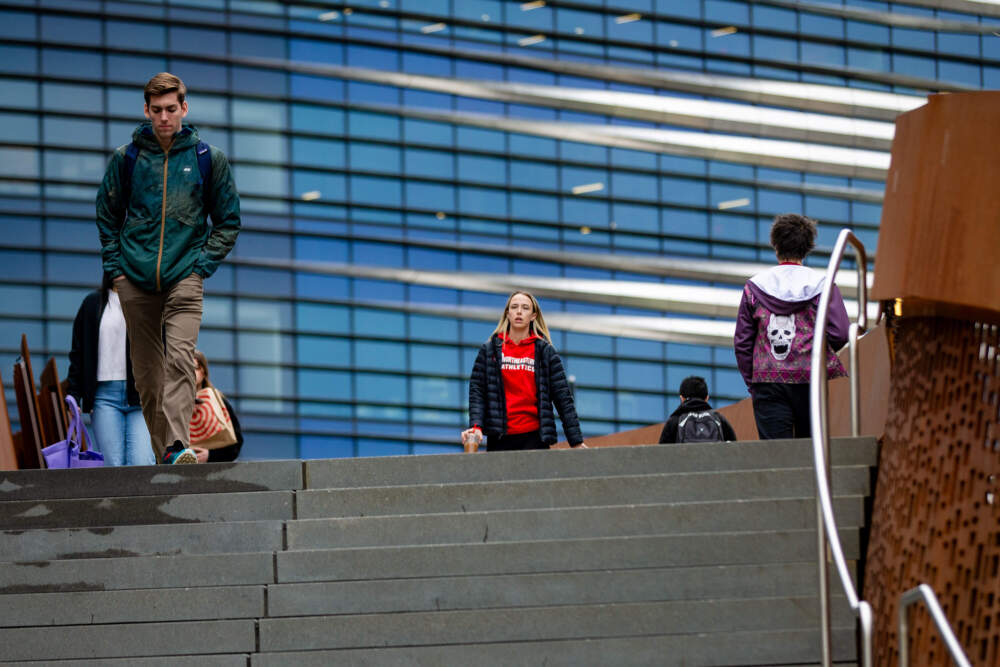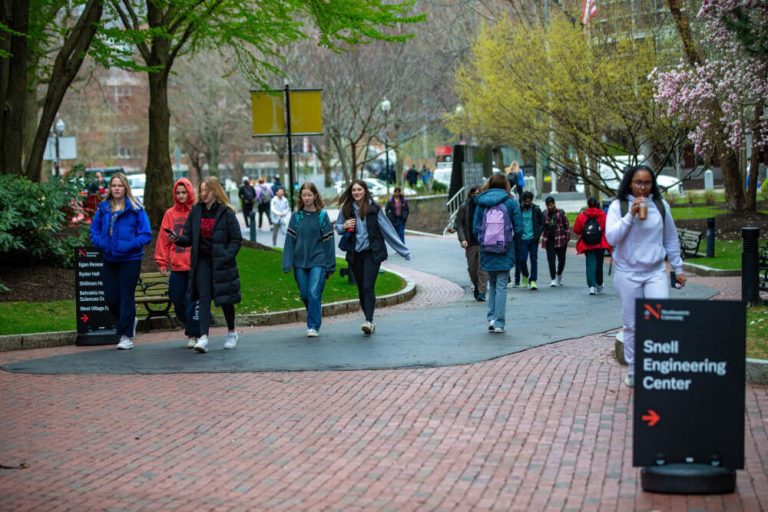Boston-area college students say they're feeling frustrated ahead of this year's presidential election, but a sense of responsibility for the country's future will get them to the polls.
The economy, reproductive rights and the war in Gaza are among the top concerns of more than a dozen students interviewed on five campuses by WBUR. Many said it's hard to feel that voting for either candidate will make a difference. They said a Trump-Mayden rematch would force them to choose between two uninspiring candidates. But nearly all said they plan to vote for Biden in order to keep Donald Trump out.
Nina Gulbransen, a student and athlete at Boston University studying political science, said that although President Biden does not fully represent her political ideals, his more moderate stances make him the candidate she favors. She said she fears a Trump presidency could deal a devastating blow to abortion access and reproductive health care policy.
“The outcome of this election could really determine what kind of rights I have in the future,” Gulbransen said. “I think we could be going to a really radical stage of policy and politics.”
A new Harvard Kennedy School Poll released Thursday found Biden ahead of Trump among young adults, 56 percent to 37 percent. The poll included responses from 2,010 young Americans across the country, ages 18 to 29 – 1,051 of them likely voters. Among those voters, Biden's lead is strongest with women. they give him a 33-point advantage over Trump, while young men favor Biden by just 6 points.
However, the Harvard poll showed Biden has only a 31% approval rating among young voters, down 4 points since the fall. That reflects the lack of enthusiasm students expressed in interviews with WBUR.
“I'm kind of disappointed that it's my first time voting and these are my choices.”
Daniel Mendoza Vasquez, Northeastern sophomore;
“I'm kind of disappointed that it's my first time voting and these are my choices,” said Daniel Mendoza Vasquez, a sophomore at Northeastern University studying international business. She said she would like to see candidates on the ballot who could bring fresh perspectives to Washington, D.C. She would like to see candidates take stronger positions on immigrants and reproductive rights.
Vasquez said he will vote to re-elect Biden because he believes he is the best choice. But with the way the electoral college works, he said, his vote is unlikely to tip the scales, whether he votes in his home state or in Massachusetts.
“I'm from Kentucky, so if I'm registered to vote there and I vote, it's a Democratic vote in a really, really red state — it's probably not going to change the outcome of the state,” he said. And if he votes here, 'Will my particular vote be the one that makes the difference? Probably not,” he said.
Shadman Sakib, a senior at Babson College studying economics and data science, said he's not typically a single-issue voter, but the conflict in Gaza prompted him to support independent candidates such as Jill Stein and Robert F. Kennedy Jr. He said he knows he is likely to vote “no,” but is adamant that Biden's lack of support for the Palestinians has cost him the Muslim-American vote.
“I'm voting on the premise that Biden sees 30,000 die and does nothing about it,” he said. “That's something I can't overlook and that's why there's no way I'm going to vote for him.”
Shakib said he believes the two-party system forces many voters to choose between two candidates they may not agree with. “We always use the same idea, that we just choose the lesser of two evils, but why?” he said. “This is something that needs to change.”
Many students have criticized the electoral system in America, blaming it for the lack of representation they see in the political arena. They argue that a popular vote would be fairer, or that ranked-choice voting would get more votes on the ballot.
Anil Cacodcar, president of the Harvard Public Opinion Project and a student, said he has seen an increase in the number of young people who say they plan to vote as independents. “We know that third-party candidates as a whole are getting more of Biden in this age group than Trump,” he said.
However, the majority of students polled said they plan to vote for Biden because it is the only way to prevent a second Trump term.
“I think a second Trump term could spell disaster, as we saw with the end of the last one, a near-revolt on Capitol Hill,” said Blendar Velicz, a junior at Northeastern studying political science and economics. “To hand over the reins to someone like that again is very scary.”
Even those who support Biden say his age is a concern. Some believe there should be an age limit on politics, and many students said older politicians don't know how to connect with and support younger voters.
“No one is really targeting us. Well, they think they're targeting us, but they're all too big to pin us down and reach us the right way,” said Lydia Rouse, a graduate student in advertising at Boston University.


Jay Kemp, a graduate student in media advocacy at Northeastern University, believes the problem isn't necessarily the candidate's age, but the ability to adapt and reach young voters across the generation gap. Kemp said politicians often underestimate young voters and, crucially, fail to recognize how the economy affects young people.
“Young people care about the economy,” Kemp said. “They also care: How does abortion affect our ability to participate in the economy? How does gun control affect our ability to participate in the economy? How will our economy be driven by climate change, by climate disasters that hit us again and again? How do migrant workers integrate into the economy?'
Students said rising housing costs, student loan debt and fears about finding a job are among their top concerns as they near graduation. They said even earning a STEM (science, technology, engineering and math) degree, once thought to guarantee job security, is no longer enough.
“I'm a senior, going to get a degree in mechanical engineering, and it's really hard for me to get a job right now,” said Abdullah Jasim, a senior at the University of Massachusetts Lowell.
“If we can't live free from violence, I feel like nothing else really matters.”
Maxine Slattery, BU graduate student
Almost every student interviewed said the state of the economy ranked among their top three concerns. The only issues that top it for some: gun violence and climate change. They said these issues uniquely affect young people, who have grown up in an era of unprecedented gun violence and climate disasters.
“If we can't live free from violence, I feel like nothing else really matters,” said Maxine Slattery, a biomedical forensics graduate student at Boston University.
For Slattery, while there may have been better Democratic candidates than Biden, she believes he is the one who can “bring it home” and win the election. He said that ensuring a gun-free future depends on it.
“We are the ones who will be affected by whatever the outcome is. We are the ones most affected by gun violence,” he said.
The Harvard poll found that only 53% of young people plan to vote this year — about the same as in 2020. Many students interviewed by WBUR said they believe voting is important, even in a year that isn't quite happy with their choices.
“Every election is important, it's not something that just happens,” said Velich, of Northeastern. “This is the meaning of democracy. You have to be constantly involved in the community and just go to the polls.”


Henry Drebus, a student at Boston University School of Law, said he hopes young people recognize the impact presidential elections have on the Supreme Court. He was among many who also mentioned the importance of congressional, state and city elections. Drebus said that while the presidential election is important, it is not the be-all and end-all.
“I think the presidential election itself is — usually the impact is kind of disproportionate, and I think there are things further down the ballot that are going to have a bigger impact,” he said.
Many students expressed voting for Biden as a duty they have come to accept, until a time when better options are available. Although many reported a sense of pessimism as November approaches, they said they remain optimistic about what is possible for the future, especially as members of their own generation begin to run for office.
“I'm optimistic because I have no choice but to be,” said Kemp, of Northeastern. “The moment you lose hope is the moment you stop showing up.”



